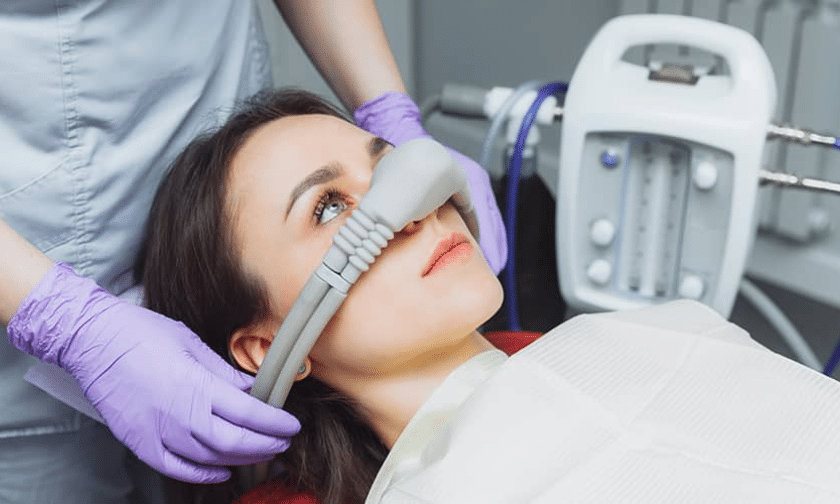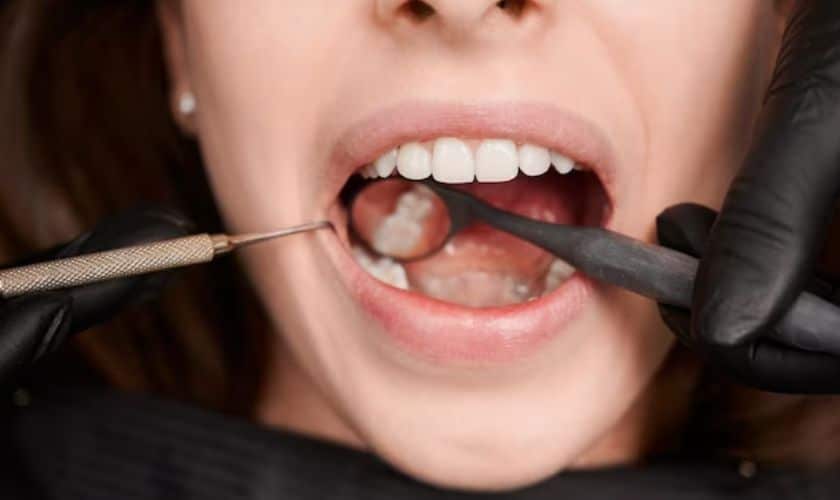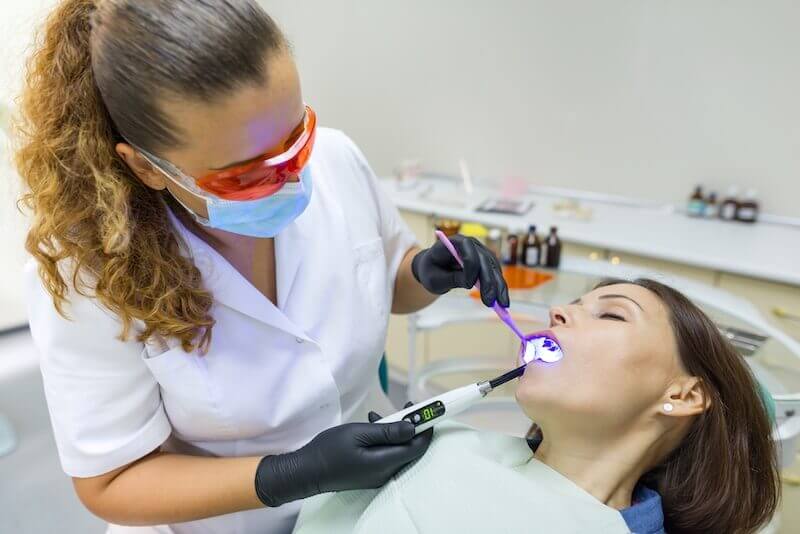
Are you someone who dreads going to the dentist? The thought of sitting in that dreaded chair, with bright lights shining down and strange instruments poking around your mouth, can be enough to make anyone feel anxious. But what if there was a way to make your dental experience more comfortable and stress-free? Enter sedation dentistry – a revolutionary solution for those who suffer from dental anxiety or have trouble sitting still during procedures.
In this blog post, we will explore the wonderful world of sedation dentistry, discussing its various types, benefits, and precautions. We’ll also delve into the factors you should consider when deciding if it’s right for you. So please grab a cup of tea (or maybe something stronger to calm those nerves), sit back, and let us guide you through this informative journey toward painless dental visits!
Types Of Sedation Used In Dentistry
When it comes to sedation dentistry, different types of sedation can be used depending on the patient’s needs and preferences. One common type is nitrous oxide, also known as laughing gas. This form of sedation is inhaled through a mask and helps patients relax during dental procedures.
Another type of sedation is oral conscious sedation, which involves taking medication before the appointment to induce a state of relaxation. This medication can range from mild to moderate, depending on the level of anxiety or fear experienced by the patient.
For those who require a deeper level of relaxation, intravenous (IV) sedation may be used. With this method, medication is administered directly into the bloodstream for quick and effective results. IV sedation allows patients to remain conscious but deeply relaxed throughout their dental treatment.
In certain cases where patients have severe anxiety or phobia about dental visits, general anesthesia may be an option. Under general anesthesia, patients are completely unconscious during the procedure and have no memory of it afterward.
Each type of sedation has its benefits and considerations. It’s important for individuals considering these options to consult with their dentist or oral surgeon to determine which type would be most suitable for their specific needs.
Benefits Of Sedation Dentistry
Sedation dentistry offers numerous benefits that can make dental procedures a much more comfortable and stress-free experience for patients. One of the main advantages is that it helps to alleviate anxiety and fear associated with visiting the dentist. Many people have dental phobias or anxieties, which can prevent them from seeking necessary dental care. With sedation dentistry, these individuals can finally receive the treatment they need without feeling overwhelmed by fear.
Another benefit of sedation dentistry is pain management. Dental procedures can sometimes be painful or uncomfortable, especially those that involve drilling or extraction. Sedation techniques help to minimize pain sensations, allowing patients to undergo treatments without distress.
For patients who have a sensitive gag reflex or difficulty sitting still for long periods, sedation dentistry can be incredibly helpful. The relaxation induced by sedatives allows for easier positioning and reduces the likelihood of triggering gag reflexes during treatment.
Moreover, sedation dentistry enables multiple procedures to be completed in one visit. For individuals with busy schedules or limited availability, this convenience is invaluable as it minimizes the number of visits required for extensive treatments.
The benefits offered by sedation dentistry make it an excellent option for patients who struggle with anxiety, discomfort during dental appointments, or complex treatment needs. By choosing this approach, individuals can feel more at ease and take better care of their oral health without unnecessary stress and apprehension.
Candidates For Sedation Dentistry
Are you someone who experiences intense fear or anxiety when it comes to visiting the dentist? If so, you may be a candidate for sedation dentistry. This innovative approach to dental care is designed to help patients like you feel more relaxed and comfortable during their appointments.
Candidates for sedation dentistry include individuals with dental phobia, severe anxiety, or a low pain threshold. It can also be beneficial for those who require extensive dental work or have sensitive gag reflexes. Sedation dentistry can even benefit children who struggle with staying still during procedures.
Before undergoing any sedation, it is important to discuss your medical history and any medications you are currently taking with your dentist. They will evaluate your overall health and determine if sedation is safe for you.
It’s worth noting that not all dental practices offer sedation options, so it’s important to find a dentist who specializes in this area if you are considering this option. Look for a dentist who is experienced in providing various levels of sedation and has a positive reputation among patients.
Remember, deciding whether sedation dentistry is right for you ultimately depends on your individual needs and comfort level. Speak openly with your dentist about your concerns and ask questions about the different types of sedation available. Together, you can make an informed decision that will allow you to receive the necessary dental care without unnecessary stress or discomfort.
Precautions And Safety Measures
When considering sedation dentistry, it is crucial to prioritize your safety. Before undergoing any dental procedure with sedation, several precautions and safety measures should be taken into account.
First and foremost, it is essential to disclose your complete medical history to your dentist. This includes any allergies, medications you are currently taking, and any pre-existing health conditions. By providing this information upfront, your dentist can assess if sedation dentistry is suitable for you and determine the most appropriate type of sedation.
Additionally, a thorough examination of your vital signs will be conducted prior to the procedure. This ensures that you are in good overall health before undergoing sedation.
During the procedure itself, continuous monitoring of key indicators such as heart rate, blood pressure, oxygen levels, and breathing patterns is essential. Trained professionals will closely observe these factors throughout the entire process to ensure a safe experience.
Choosing The Right Dentist For Sedation
Choosing the right dentist for sedation dentistry is an important decision that can greatly impact your overall experience. It’s crucial to find a dentist who not only specializes in sedation dentistry but also makes you feel comfortable and at ease throughout the process.
One of the first things to consider when selecting a dentist for sedation is their level of expertise and experience in administering various types of sedation. You want someone who has undergone specialized training and has successfully performed sedation procedures on numerous patients.
Another factor to consider is whether the dentist offers a range of options for sedation, such as oral medication, nitrous oxide, or intravenous (IV) sedation. Each person may have different needs, so having multiple options available ensures that you can choose the method that best suits your comfort level and requirements.
Additionally, it’s essential to research the dentist’s reputation and read reviews from past patients. This will give you insight into their professionalism, bedside manner, and how well they communicate with their patients.
Furthermore, consider scheduling a consultation with potential dentists before making your decision. During this appointment, ask questions about their approach to sedation dentistry and discuss any concerns or fears you may have. Pay attention to how they respond – do they listen actively? Do they address your worries?
Trust your instincts when choosing a dentist for sedation. If something feels off or if you feel you need more confidence in their abilities or demeanor during your initial meeting with them, it may be best to continue searching until you find someone who meets all of your criteria.
Remember that finding the right dentist for sedation can make all the difference in ensuring a positive dental experience. Take your time researching and evaluating different options until you find someone who meets both your technical requirements and instills confidence and trust within you.
Personal Factors To Consider
- When deciding if sedation dentistry is right for you, there are several personal factors that you should consider. First and foremost, think about your level of dental anxiety or fear. If the thought of going to the dentist makes you feel extremely anxious or scared, sedation dentistry may be a good option for you.
- Another factor to consider is your overall health and any pre-existing medical conditions. It’s important to inform your dentist about any medications you are currently taking or any health issues you have. This will help them determine if sedation dentistry is safe for you.
- Additionally, think about the complexity of the dental procedure that needs to be done. If it’s a simple filling or cleaning, sedation may not be necessary. However, if it involves oral surgery or a more invasive procedure, sedation can help make it more comfortable and manageable.
- Your schedule and availability also play a role in deciding if sedation dentistry is right for you. Some forms of sedation require additional recovery time after the procedure, so make sure to plan accordingly.
- Consider your budget and insurance coverage. Sedation dentistry can sometimes be an additional cost on top of the dental procedure itself. Check with your insurance provider to see what they cover and if there are any limitations.
- Taking these personal factors into account will help guide your decision on whether or not sedation dentistry is right for you. Remember to discuss all concerns with your dentist, who can provide guidance based on your specific situation.
Final Thoughts And Recommendations
When it comes to deciding if sedation dentistry is right for you, there are several factors to consider. It’s essential to understand the types of sedation available, the benefits it offers, and whether or not you meet the criteria as a candidate. Additionally, taking precautions and choosing the right dentist who specializes in sedation are crucial steps.
Sedation dentistry can be a game-changer for those with dental anxiety or specific medical conditions that require extra assistance during procedures. The calmness and relaxation it provides allow patients to receive necessary dental treatments without fear or discomfort.
However, before diving into sedation dentistry, it’s important to evaluate personal factors such as your overall health condition, past experiences with dental procedures, and financial considerations. Discussing these aspects with your dentist will help determine if this option aligns with your individual needs and preferences.


